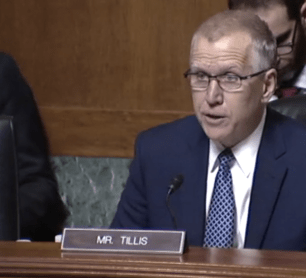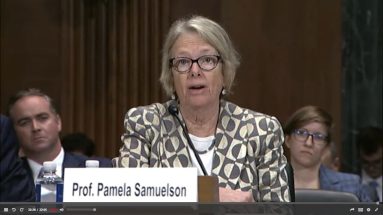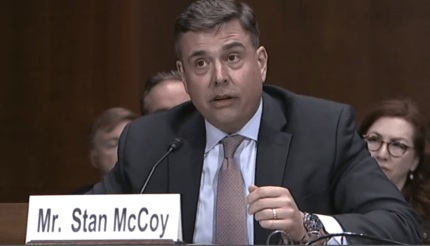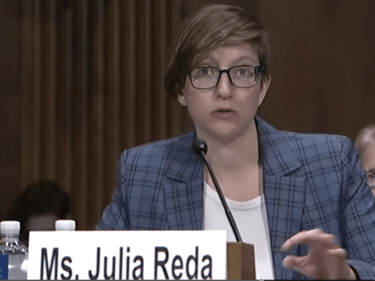Senate IP Subcommittee Examines Foreign Approaches to Digital Piracy in Second Hearing on U.S. Copyright Reform

“We finance our projects by granting companies exclusive distribution rights,” Yunger said. “Why would any financial partner pay for movies that are widely offered for free online knowing full well that they may never recoup their investments?” – Jonathan Yunger, Millennium Films

Senate IP Subcommittee Chair, Senator Thom Tillis (R-NC), yesterday led the second in a series of Subcommittee hearings addressing the possibility of updating the U.S. Digital Millennium Copyright Act (DMCA). The hearing, titled “Copyright Law in Foreign Jurisdictions: How are other countries handling digital piracy?”, was aimed at examining foreign copyright laws in order to consider what may or may not be beneficial if adopted by the United States. The first of two panels included four witnesses from academia: Professor Justin Hughes of Loyola Marymount University Law School; Professor Pamela Samuelson of the University of California Berkeley School of Law; Professor Michael D. Smith of the Carnegie Mellon University; and Professor Daphne Keller of Stanford University.
Time For an Update
Professor Justin Hughes began by noting that the DMCA is not “obsolete on arrival or broken,” but it is time that Congress looked again at the DMCA in light of what other countries are doing to enforce copyrights in the digital network environment. He addressed the European “Single Digital Market Directive” (the Directive), with particular emphasis on Article 17, noting that Article 17 represents “a limited break from the late 1990s/ early 2000s consensus on internet service provider (ISP) liability… a break that truly does reflect the new realities of the Internet.”

Article 17 prohibits content-sharing platforms from displaying unlicensed copyrighted content on behalf of their users and puts the burden of liability on the platforms.
In his written testimony, he explained that Article 17 “establishes a different regime of responsibility and liability for a new sub-category of ISPs called ‘online content-sharing service providers,’” which presumably would include sites such as “Dailymotion, Facebook, Instagram, Vimeo, and YouTube.” Hughes further explained that Article 17 sets forth a licensing or filtering requirement for online content-sharing service providers, which is “intended to be proportional and flexible.” He concluded that the Directive warrants further study and consideration by the Senate. Throughout his oral and written testimony, he also commented that the DMCA’s Section, “Limitations on liability relating to material online,” is underutilized and warrants a closer look.
Did Europe Go Too Far?
In contrast, Professor Pamela Samuelson warned that Article 17 of the Directive is not a good model to follow and is internally contradictory and ambiguous. In her written testimony she noted that the “EU has adopted a complex regulation that will make it very difficult, and perhaps impossible, for most user-generated content (UGC) platforms to continue to operate and offer culturally diverse contents to EU residents” and “[i]mposing Article 17-like obligations on US-based ISPs would create the very kinds of entry barriers that Congress sought to avoid in 1998.”

Professor Michael D. Smith noted that his testimony draws on over 20 years of empirical research into the impact of technological change on economic markets for entertainment goods, which led to a recently completed Piracy Landscape Study for the U.S. Patent and Trademark Office (USPTO). His testimony pointed out the harm created by piracy and emphasized that both “demand-side and supply-side anti-piracy efforts implemented worldwide have been effective at reversing these harms by increasing the search and transactions costs necessary to locate and consume pirated content online.”
Professor Daphne Keller discussed intermediary liability laws, i.e. “the laws that define platforms responsibility for content posted by their users including the DMCA” and noted that international approaches to intermediary liability fall along a broad spectrum, with the DMCA falling somewhere in the middle. In her oral and written testimony, she also addressed the “de facto filtering mandate” of Article 17 of the European DSM Directive, which “instructs covered platforms to make ‘best efforts’ to prevent uploads of specified works, but to simultaneously protect users’ rights to quote, criticize, parody, and otherwise lawfully use those same works.” She explained that Article 17 has harm-prevention benefits, and “real costs for speech, innovation, and other important values.” However, she notes, there is inadequate information regarding “how common filtering failures are, how often human review corrects them, how effective counternotice systems are, or what patterns of bias or disparate impact may infect these systems.”
Solutions
Senator Tillis asked the panelists what variants we are seeing in the international community that are working and what we might want to consider with respect to notice and takedown. Professor Hughes noted that copyright owners throughout the world are using the U.S. notice and takedown provision, DMCA Section 512(d), so we are providing the global enforcement mechanism for notice and takedown when it comes to search engines. Professor Keller agreed with Professor Hughes’ comments and further suggested that Argentina’s precedent, which says that “if this is a hard call [such as] parody or news reporting, we don’t want private notices and take down processes to take care of it, we want it to go to a court instead,” is worth considering.
Industry Insight

The hearing’s second panel was comprised of members of industry and government. Stan McCoy of the Motion Picture Association championed the practice of site blocking, which he said has been implemented by 34 countries, including Australia, many EU member states, India and the UK. Site blocking allows ISPs to disable access to a given piracy site. The remedy has been “very effective,” said McCoy. “It curtails illegal conduct and expands legitimate commerce, and the Internet still works,” he said. Contrary to popular fears, it has not resulted in undermining security or free speech, and innovation continues he added.
With respect to the Directive’s Article 17, McCoy said that, while “laudable in its initial goals,” the provision became muddled “due to a well-funded disinformation campaign equating protecting copyright with censorship.” As a result, Article 17 “fails to offer a real improvement on the existing EU law of online liability, which is both sound and still developing,” McCoy said.
Two more issues stand in the way of stronger direct action against perpetrators of piracy, added McCoy. First, it’s too difficult to identify the operators of pirate sites as they hide far away, and this has been exacerbated by ICANN’s May 2018 approach to complying with the EU General Data Protection Regulation (GDPR)in which they restricted public access to identity data (known as WHOIS). – “Reasonable access can and should be restored” for IP owners, said McCoy.
Second, Free Trade Agreements can do more to help by requiring that other jurisdictions impose secondary liability on ISPs. “Congress should work with the administration to prevent export of [provisions] that confer broad immunity from illegal behavior, eroding the rule of law,” McCoy said.
The Difficulty of Detecting Infringement
Julia Reda, a former member of the Pirate Party Germany in the European Parliament, said that Article 17 has created similar controversy to the SOPA/PIPA debate of several years ago. The key problem, said Reda, is that “there is no technology that can do what Article 17 requires. There is no wizard algorithm with a sense of humor that can tell the difference between a parody and an infringement.” As a result, ISPs have to err on the side of either deleting too much or too little. “This will harm smaller platforms the most,” she said.

Jonathan Yunger of Millennium Films lamented the environment that digital piracy has created for the film industry. In June 2018, Millennium Films did an accounting of its films that appeared on YouTube without permission, said Yunger, and found over 200 pirated titles on the platform that had been viewed over 110 million times in one month. “We finance our projects by granting companies exclusive distribution rights,” Yunger said. “Why would any financial partner pay for movies that are widely offered for free online knowing full well that they may never recoup their investments?”
Yunger also lauded the practice of site blocking and pointed to the UK’s PIPCU (Police Intellectual Property Crime Unit) as a leading model for the world. In one example, the PIPCU tracked down a hacker who had stolen and released a copy of The Expendables III one month before its theater release, leading to bankruptcy for Millennium Films’ Russian distributor. “PIPCU helped our American company bring a pirate to justice,” Yunger said.
Matt Schruers of the Computer & Communications Industry Association (CCIA) emphasized that stopping piracy is not solely about enforcement. Companies must also ensure that lawful consumption is realistically facilitated. For example, new digital service models have developed in the United States that have been effective in combating piracy.
During the Q&A, the panelists reiterated solutions such as site blocking and stronger FTA provisions, and Yunger suggested that a felony streaming law would be helpful to his industry.
Reda summed up the extent of the challenge Congress is facing:
I think the goal of copyright to provide a framework for innovation and creation is extremely important. A challenge is that we all have copyright creation and infringement machines in our pockets. I think that’s the problem we’re seeing today [is that] copying is just part of all digital technology, and we need to think more fundamentally about how we can ensure that investments in creations are safeguarded on the one hand, but that we’re also not limiting very useful technology developments in the process.


